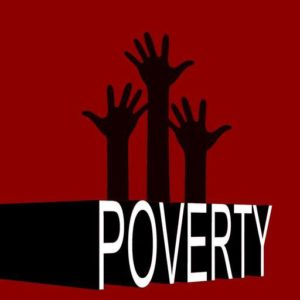The rich are judged by how they treat the poor.
Poverty is real, has real consequences, for real people, with real needs.
 Poor people in particular are targeted as the “have-nots” in American politics. Poverty seems always to be a “wedge issue” for debate. One party will tend to label the other as “the party of the rich” speaking of themselves as serving the needs of the poor, when, indeed, American politicians tend to be rich: they bear the burden of poverty-politics.
Poor people in particular are targeted as the “have-nots” in American politics. Poverty seems always to be a “wedge issue” for debate. One party will tend to label the other as “the party of the rich” speaking of themselves as serving the needs of the poor, when, indeed, American politicians tend to be rich: they bear the burden of poverty-politics.

Sex, money, and power are said to control the world. It strikes me as I read the Hebrew prophets, however, that the latter two issues are much more pronounced in God’s judgment than is sexual sin, which is almost never mentioned. Over and over again God rails against those that “have” misusing those who “have not.” [For an example of biblical-social-justice see my essay here entitled “Morality”.]
 Scripture, on the other hand, labels people in a different way. The economically powerful are to protect the economically weak. [For instance, read my essay here entitled “gleaning”.] God warned people that political leaders would come with economic conditions causing severe consequences (1 Sam 8:11-17). The awfulness of land-grabbing, lying, court-corrupting, murdering, self indulgent leaders is no where better captured than when Ahab stole land from Naboth (1 Kings 21).
Scripture, on the other hand, labels people in a different way. The economically powerful are to protect the economically weak. [For instance, read my essay here entitled “gleaning”.] God warned people that political leaders would come with economic conditions causing severe consequences (1 Sam 8:11-17). The awfulness of land-grabbing, lying, court-corrupting, murdering, self indulgent leaders is no where better captured than when Ahab stole land from Naboth (1 Kings 21).
Laziness may be cited as one reason for poverty in Proverbs (6:11; 10:4, 15; 13:18; 20:13; 22:1; 28:11; 30:8-9). However, Proverbs chapters 28 and 29 specifically indicate that the “ruling classes” bear responsibility for economic direction of a country. [See my essay here entitled “peace.”]
 Uncaring attitudes for the poor that arise from wealth and privilege are cited as reasons for judgment (Isa 3:16-26; Amos 4:1-3; 8:4-6). The exile of Judah was largely the result of economic injustice (Amos 2:6-7; 5:7-12; Micah 3:8-12), as was the flood (Gen 6:6, 11, 13). In Genesis 6:11 and 13 when God judged the “earth filled with violence” the Hebrew word hamas was used. God desires to fill the earth through human procreation (Gen 1:28; 9:1), whereas the greedy fill the earth by procreating violence (Ezek 8:17; 28:16). [1] The prophets use the same word to describe the exploitation of the poor by the rich (Amos 3:10; Micah 6:12).
Uncaring attitudes for the poor that arise from wealth and privilege are cited as reasons for judgment (Isa 3:16-26; Amos 4:1-3; 8:4-6). The exile of Judah was largely the result of economic injustice (Amos 2:6-7; 5:7-12; Micah 3:8-12), as was the flood (Gen 6:6, 11, 13). In Genesis 6:11 and 13 when God judged the “earth filled with violence” the Hebrew word hamas was used. God desires to fill the earth through human procreation (Gen 1:28; 9:1), whereas the greedy fill the earth by procreating violence (Ezek 8:17; 28:16). [1] The prophets use the same word to describe the exploitation of the poor by the rich (Amos 3:10; Micah 6:12).
 Dishonesty (Amos 8:4-6), selfishness (through loans, Amos 5:11), loving things over people (Isa 5:8; Micah 2:1-4), and courtroom bribery through unjust judges (Isa 1:23; 3:13-15; Amos 5:7, 10, 12) are targets of prophetic condemnation. Scripture judges the rich by how they treat the poor (Job 29:12, 16; Ps 112:9; see also, Deut 15:1-11; James 2:1-7, 15-16; 4:13-16; 5:4; 1 John 3:17).
Dishonesty (Amos 8:4-6), selfishness (through loans, Amos 5:11), loving things over people (Isa 5:8; Micah 2:1-4), and courtroom bribery through unjust judges (Isa 1:23; 3:13-15; Amos 5:7, 10, 12) are targets of prophetic condemnation. Scripture judges the rich by how they treat the poor (Job 29:12, 16; Ps 112:9; see also, Deut 15:1-11; James 2:1-7, 15-16; 4:13-16; 5:4; 1 John 3:17).
Economic justice is a prophetic imperative (Isa 11:5; 42:1; Ezek 45:8; Zech 14:14, 21). Biblical injunctions concerning financial justice are often tied to indebtedness. The responsibility is directed toward the creditors—those who have the financial ability to abuse others by lending at interest (Ex 22:25-27; Lev 25:35-38; Deut 23:19, 20). Judgments against the lending-borrowing practice focused on exorbitant interest charged to those in need while “the rich became richer” (2 Kings 4:1-7; Neh 5:1-13; Ps 15:5; Prov 28:8; Jer 15:10; Ezek18:13; 22:12; Hab 2:7). [See “financial rape” [2] below.]
 A communitarian emphasis developed in the early church where people shared the wealth they owned with each other, which included monetary gifts demonstrating participation in ministry (Acts 2:44-45; 4:34-37). The Greek word koinonia includes monetary gifts as “fellowship” as seen in Philippians 4:10-19. [Further comments on fairness, social consciousness, equality, and equity can be found in my essay here entitled “That’s Not Fair!”]
A communitarian emphasis developed in the early church where people shared the wealth they owned with each other, which included monetary gifts demonstrating participation in ministry (Acts 2:44-45; 4:34-37). The Greek word koinonia includes monetary gifts as “fellowship” as seen in Philippians 4:10-19. [Further comments on fairness, social consciousness, equality, and equity can be found in my essay here entitled “That’s Not Fair!”]
 Christian teaching on poverty must include the following ideas and ideals: (1) God, not humans, owns everything; (2) custodial conservation of the earth is dependent upon faithful, responsible, creative people; (3) giving is to be “open-handed” versus “tight-fisted” (Deut 15:7-11); (4) stewarding creation should be prompted by and considerate of the next generation; (5) history curricula should include a poverty focus from the vantage point of corrupt governments as much as it might corrupt businesses; (6) teaching on private ownership and responsible stewardship should be wedded; (7) wealth produces accountability and opportunity to benefit all (1 Tim 6:17-19). [On these and other points see my essay here entitled “giving”.]
Christian teaching on poverty must include the following ideas and ideals: (1) God, not humans, owns everything; (2) custodial conservation of the earth is dependent upon faithful, responsible, creative people; (3) giving is to be “open-handed” versus “tight-fisted” (Deut 15:7-11); (4) stewarding creation should be prompted by and considerate of the next generation; (5) history curricula should include a poverty focus from the vantage point of corrupt governments as much as it might corrupt businesses; (6) teaching on private ownership and responsible stewardship should be wedded; (7) wealth produces accountability and opportunity to benefit all (1 Tim 6:17-19). [On these and other points see my essay here entitled “giving”.]
 Dr. Mark Eckel is President of The Comenius Institute (website), spends time with Christian young people in public university (1 minute video), hosts a weekly radio program with diverse groups of guests (1 minute video), interprets culture from a Christian vantage point (1 minute video), and teaches weekly at his church each fall (video). Picture credit: snappygoat.com
Dr. Mark Eckel is President of The Comenius Institute (website), spends time with Christian young people in public university (1 minute video), hosts a weekly radio program with diverse groups of guests (1 minute video), interprets culture from a Christian vantage point (1 minute video), and teaches weekly at his church each fall (video). Picture credit: snappygoat.com
[1] Mathews, Genesis 1-11:26, p. 359.
[2] It should be noted that borrowing is always viewed in a negative light in Scripture (Prov 17:18), something one would want to avoid (Prov 22:7). However, borrowing is not altogether outlawed (Ex 22:25; Ps 37:26; Matt 5:42; Lk 6:35). It should be also noted that the original etymological range of the word “loan” meant to take a bite or consume. “Don’t bite off more than you can chew” or “be careful he doesn’t take a bite out of you” are common reminders. So borrowing is allowed though not advocated. See Alysa’s excellent essay here on “financial rape.”


